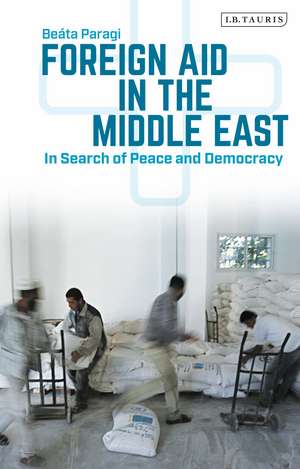Foreign Aid in the Middle East: In Search of Peace and Democracy
Autor Beáta Paragien Limba Engleză Hardback – 27 feb 2019
Preț: 656.47 lei
Preț vechi: 943.11 lei
-30% Nou
Puncte Express: 985
Preț estimativ în valută:
125.61€ • 131.15$ • 103.96£
125.61€ • 131.15$ • 103.96£
Carte tipărită la comandă
Livrare economică 04-18 aprilie
Preluare comenzi: 021 569.72.76
Specificații
ISBN-13: 9781788315210
ISBN-10: 1788315219
Pagini: 320
Ilustrații: N/A
Dimensiuni: 138 x 216 x 20 mm
Greutate: 0.5 kg
Editura: Bloomsbury Publishing
Colecția I.B.Tauris
Locul publicării:London, United Kingdom
ISBN-10: 1788315219
Pagini: 320
Ilustrații: N/A
Dimensiuni: 138 x 216 x 20 mm
Greutate: 0.5 kg
Editura: Bloomsbury Publishing
Colecția I.B.Tauris
Locul publicării:London, United Kingdom
Caracteristici
Investigates how international social bonds between the donor and the recipient have been shaped by foreign aid.
Notă biografică
Beáta Paragi is Associate Professor at the Corvinus University of Budapest, Hungary. She was previously a visiting researcher at the Hebrew University of Jerusalem and an EU Marie Curie fellow at The Fafo Research Foundation in Norway. Her publications in English include articles in the journals Current Anthropology, Alternatives and the Journal of Intervention and Statebuilding and a contribution to the book European Development Cooperation: In Between the Local and the Global.
Cuprins
AcknowledgementsList of Abbreviations and AcronymsContemporary gifts. An introductionChapter 1. The market, the society and the giftExchange theories in a nutshellSocial exchangeGift exchangeThe modern gift: from Christmas presents to global solidarityChapter 2. The contemporary giftForeign aid in international relationsCritique of foreign aidApplying the gift exchange framework to foreign aid relationsSocieties comparedMain features of the international gift: object and relationship in contemporary IROn the diversity of actors in aid implementationThe relationship and the objects: contemporary gifts and return giftsThe merits of the gift: stabilizing order, substituting warsGift-giving, reciprocity and indebtedness at the level of theoriesReciprocity and indebtedness in IRThe role of contemporary gifts: managing orderThe 'spiritual essence': values, norms and identities conveyed by foreign aidInsights from the philosophy of the giftImpossibility and sacrificeConditionality in foreign aid relationsChapter 3. Traditional, religious and contemporary gifts in the Middle EastGifts in premodern societies and generosity in the Middle EastFeatures of contemporary foreign aid in the Middle EastThe origins and background of Western donor presence in the Middle EastArms trade and the politics of exceptionalismGifts, reciprocity and return gifts - in the contemporary Middle Eastern relationsThe Arab Spring and the conflicting objectives of foreign aidBattles for external legitimacy: ccompeting for contemporary giftsLegitimacy in the Middle EastContest for external legitimacy in the Middle East and its domestic impactsChapter 4. In Search of Peace, Stability and Democracy in the Middle EastU.S. aid for regional stability and Israeli securityEU assistance for regional stability by supporting the peace processEuropean reactions to the Arab SpringThe European public opinion behind donor policiesSimply saying: The U.S. set the rules, the EU paid the billAid for managing order (keeping stability and peace)Aid for (missing) political and economic reformsAid for supporting politically conscious actors in the civil societyAid for (the lack of) stability. The case of humanitarian assistanceRegime survival and public opinion on foreign donorsAid as rentLocal public opnion on foreign donorsChapter 5. The (im)possibility of contemporary giftsReturning contemporary foreign gifts: trading threats, trading painsThe 'spirit' of contemporary gift and the image of the 'foreign agent'Importing foreign (Western, global or neoliberal) ideas and its pricePunishing the foreign agentThe (im)possibility of foreign aid: supporting stability vs democratizationConclusionAnnex - interview detailsBibliography (List of References)Notes
